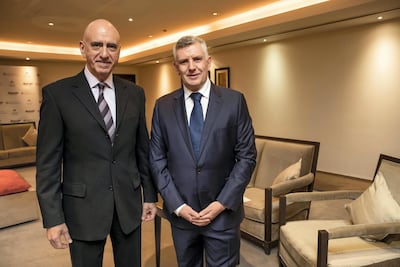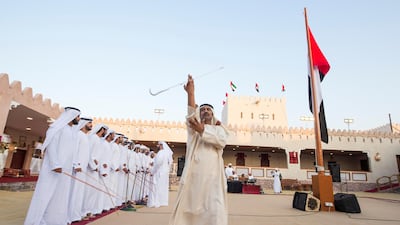More Emiratis are choosing to work in the tourism industry, using their local knowledge and language skills to their advantage.
Emiratis have traditionally preferred to work in government because of the benefits on offer and the chance to serve their country.
But private sector jobs in hospitality are becoming an attractive option for those seeking new challenges while maintaining a good work-life balance and a high salary.
Hotels and tourism companies have also begun to recognise the value of having Emiratis in front-of-house roles.
"You are seeing more Emiratis working in hotels than five years ago because organisations are targeting them to be the face of their companies," said Vijay Gandhi from HR specialists Korn Ferry.
He said part of the appeal for Emiratis was a sense of pride that came with "being the face of the UAE when it comes to welcoming people to the country".
"The wages are also attractive, which drives nationals to hospitality." He said organisations were paying more to attract local staff than they would for non-nationals.

Last week, 10 Emiratis signed up to a one-year training programme called Tahseen, with the guarantee of a management position on completion at Marriott International in Dubai.
Of those who registered, eight were women who said they were actively avoiding "8am to 3pm desk jobs" with the government.
“I didn’t want to work in the public sector because I couldn’t see myself behind a desk doing the same thing every day,” said Hind Al Mazrouei, 28.
She said her decision to explore opportunities in the private sector came as a surprise to her Emirati friends.
“They asked why I didn’t choose to work for the government because they offered bigger salaries and shorter working hours, but I never saw myself doing this.
“It’s my dream to work in hospitality and it came at the right time.”
The government has long encouraged Emiratis to explore opportunities in the private sector, launching Emiratisation programmes and issuing legislation to make the private sector more attractive to them.
Last week, the UAE Cabinet issued a decree unifying the number of public holidays allocated to government and private sector workers.
Government employees previously enjoyed more public holidays than those working in the private sector. Now, both sectors will have 14 public holidays each year.
"You rarely see Emiratis working in the private sector but that's going to change," Ms Al Mazrouei said.
Kauthar Al Kindi, 27, said her new colleagues at Dubai’s Grosvenor House Hotel were shocked to find themselves working alongside an Emirati.
“Some of them couldn’t understand why an Emirati was not working in the public sector,” she said.
“They didn’t know if they were allowed to shake my hand and said they had been told by friends they weren’t allowed to approach Emiratis.”
She said the challenge of working in the private sector and the opportunity to meet new people made it an easy decision for her.
"When you are in a government role, you are behind the same desk every day doing the same things at the same time," Ms Al Kindi said.
“By working in hospitality I get to meet so many new faces from different countries every day.”
Alex Kyriakidis, president and managing director for Marriott International in the Mena region, urged the government and schools to promote the tourism industry to young Emiratis, particularly young Emirati women looking for different opportunities.
“It’s especially the case in Dubai where the future is critically dependent on hospitality," he said.
“They need to let people know that it is okay for Emirati women to be in the hospitality industry.”
Marriott is not the only hotel group embracing Emiratisation.
This year, Millennium Hotels and Resorts launched the TooMooh programme to promote local talent.
Ali Alzaabi, president of Millennium Hotel & Resorts MEA, said having more Emiratis in the workforce would make for a more authentic experience for guests visiting the UAE.
He said Emiratis’ local knowledge and language skills would give them an advantage over staff who had been recruited from abroad.
“The Arabs are globally known for their warm hospitality tradition,” he said.
“But the hospitality industry in the Arab world is dominated by expatriates.
“With proper training, grooming and mentoring of local talent, we could change the landscape and help create more jobs for UAE nationals, who could one day lead the tourism industry by example.”


